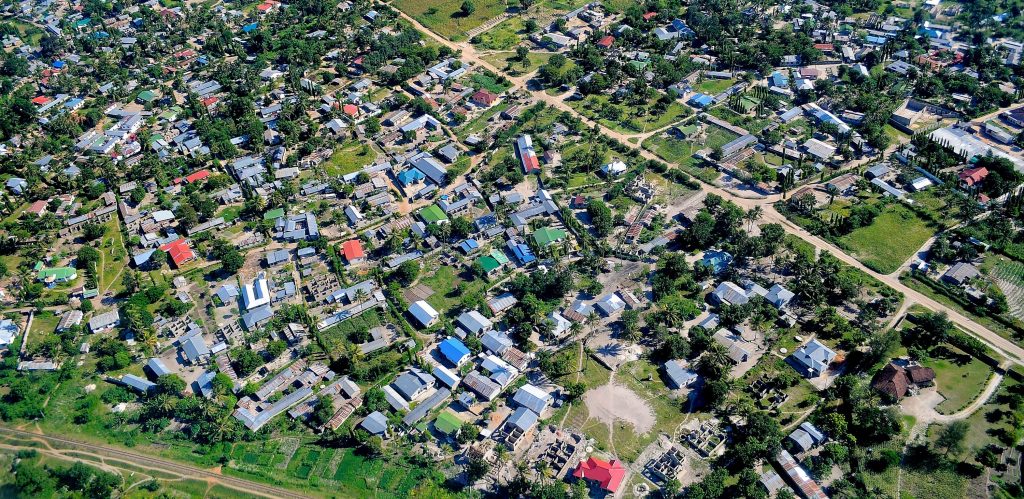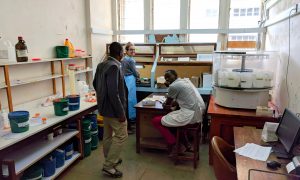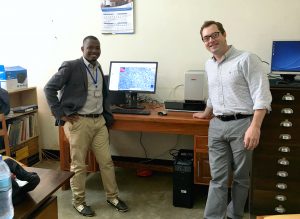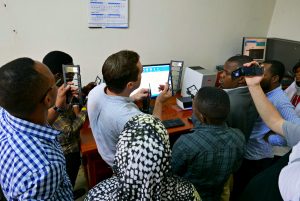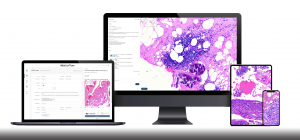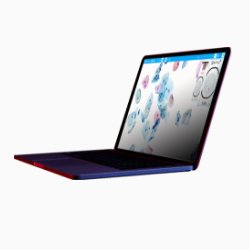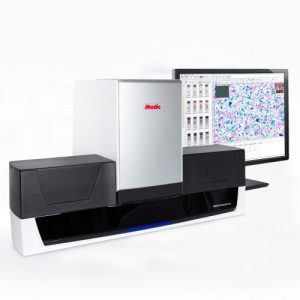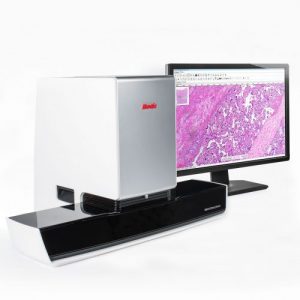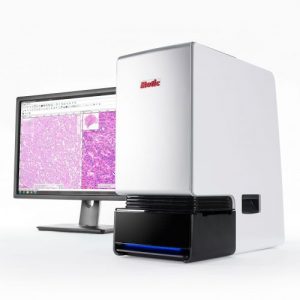Over the past 40 years, humanity has progressed leaps and bounds in combating HIV, TB, and malaria in the least fortunate corners of our world. While these diseases still persist and are far from being completely solved, other alarming trends have emerged in recent years, with 70% of cancer-related deaths now occurring in low- and middle-income countries. The new challenge, in some senses, is how to adapt our strategy from tackling acute, communicable diseases to fighting cancer and other long-term diseases that require in-depth knowledge and expertise to diagnose.
To bridge this gap, local medical centers need to be working closely and constantly with experts in the field, and finding agile, yet scalable solutions are more critical than ever – especially with under-resourced communities and global expertise spread all around the world.
This is precisely why Cristina Costales, M.D. spent close to a year at the Kilimanjaro Christian Medical Centre (KCMC) to assist with implementing a digital pathology system to contribute to this fight against cancer in underserved communities. She was in Tanzania as a collaborator for an NIH-funded autopsy research project with Duke University and KCMC.
Cristina Costales grossing surgical specimens at KCMC
“I am so grateful to have had the opportunity to spend the year with amazing pathology colleagues in Tanzania,” Costales said. “While there, I experienced what it is like to practice as a surgical pathologist in a resource-limited setting.
“In the US, we take for granted the accessibility of consensus conferences and expert consultation for challenging cases. If you are one of a handful of pathologists in a country, this type of collaboration is not readily available. Implementation of the digital telepathology platform from Motic was crucial for sign-outs. We were able to receive same-day feedback on diagnoses from sub-specialist experts not only challenging cases, but also advice on grossing techniques, ancillary testing, and quality metrics. All these measures contributed to the education of the pathology staff as well as improved diagnostics for patients.”
In 2018, Motic joined the ASCP’s Partners for Cancer Diagnosis and Treatment initiative, and brought our first scanners to sub-Saharan Africa to connect front-line hospitals in these regions with global experts. Motic also donated an early version of the MoticFlow case-sharing platform to become the basis for remote collaboration on the project. Since then, the combined systems have facilitated pathologist-to-pathologist collaboration across thousands of cases, drastically improving the quality of care and patient outcomes.
Today, ASCP consultants are accessible for over 95% of patients biopsied in Rwanda, and over 75% of patients biopsied in Tanzania. In many cases, the ASCP volunteers are the only source of sub-specialty expertise available to these communities. Jeremia Pyuza, M.D., medical lab scientist at the Kilimanjaro Christian Medical Centre in Moshi, Tanzania, was one of the first clinicians trained by ASCP volunteers and the Motic team when the telepathology system was implemented.
Jeremia Pyuza, KCMC and Scott Kilcoyne, from the Motic team
“Having Motic’s telepathology system has allowed us to gain great confidence in definitive diagnoses and provide greater care for our patients at KCMC,” said Pyuza. “Last year we were able to take on over 300 cases by consulting with ASCP subspecialists for second opinions and, with the system, we have been able to address more difficult cases like GI and soft tissue pathology, as well as head and neck, breast, kidney and liver tumors.”1
Another ASCP consultant, Jane E. Brock, MBBS, PhD, Chief of Breast Pathology at Brigham and Women’s Hospital (BWH), has seen a significant boost in expertise advancement since the telepathology system was adopted at the City Cancer Challenge (C/Can) partner site in Myanmar.
“Having MoticFlow was a game-changer for our partners in Yangon, Myanmar,” said Brock. “The ability for them to easily access the subspecialty expertise here at BWH is developing their confidence and ability to diagnose difficult and rare diseases. For us, we’ve really appreciated being able to share our expertise and support them accurately diagnosing challenging and frequently unusual cases.
Collaborating on the MoticFlow platform has also given Dr. Brock new tools for better knowledge-sharing. “The platform is very intuitive and collaborative – I especially appreciate the ability to add captures with a teaching vignette, and addendums to the diagnostic report – and has tremendous potential to expand from diagnostic support to being a high-quality teaching tool.”
With the global launch of the MoticFlow last month, the platform is now generally available to institutions and organizations for multi-site, peer review, and other collaborative pathology on the cloud. The Motic team is excited to help digital pathology users, both new and old, embrace this new technology, and to share our stories and the successes of our global partners.
Scott, from the Motic team, has been working on the MoticFlow platform for the last 3 years, and has seen the evolution of the ASCP collaborations first-hand. He installed the first telepathology systems with ASCP volunteers in Rwanda and Tanzania (read more here) in 2018.
Scott Kilcoyne training the KCMC team on slide insertion for a Motic scanner
“I’m so proud to have seen firsthand how this telepathology system has helped underserved areas broaden their services and better serve their patients,” said Scott, “Users have appreciated the easy-to-use interface and have provided us great feedback for us to fine-tune MoticFlow for international use.”
To learn more about Dr. Costales’ work enabling pathology systems and collaboration in Tanzania, join our joint symposium on international telepathology at ASCP 2020 in September.
1 Dr. Pyuza would like to express his great appreciation to the KCMC administration for their support of these consultation services: “Special thanks to the KCMC administration, especially Professor Gileard Masenga, Executive Director (KCMC) & Executive Secretary (GSF), Dr. Sarah Urasa, Director of Hospital Services, Dr. Furaha J. Serventi, Head of KCMC Cancer Center, and Dr. Alex Mremi, Head of Department of Pathology, together with other members of staff in the pathology department for their courage in considering this important service for KCMC patients.”

